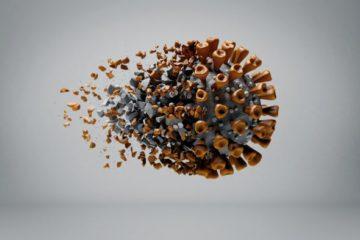Monique Brouillette in Scientific American:
 A lot of worry has been triggered by discoveries that variants of the pandemic-causing coronavirus can be more infectious than the original. But now scientists are starting to find some signs of hope on the human side of this microbe-host interaction. By studying the blood of COVID survivors and people who have been vaccinated, immunologists are learning that some of our immune system cells—which remember past infections and react to them—might have their own abilities to change, countering mutations in the virus. What this means, scientists think, is that the immune system might have evolved its own way of dealing with variants.
A lot of worry has been triggered by discoveries that variants of the pandemic-causing coronavirus can be more infectious than the original. But now scientists are starting to find some signs of hope on the human side of this microbe-host interaction. By studying the blood of COVID survivors and people who have been vaccinated, immunologists are learning that some of our immune system cells—which remember past infections and react to them—might have their own abilities to change, countering mutations in the virus. What this means, scientists think, is that the immune system might have evolved its own way of dealing with variants.
“Essentially, the immune system is trying to get ahead of the virus,” says Michel Nussenzweig, an immunologist at the Rockefeller University, who conducted some recent studies that tracked this phenomenon. The emerging idea is that the body maintains reserve armies of antibody-producing cells in addition to the original cells that responded to the initial invasion by the SARS-CoV-2 virus. Over time some reserve cells mutate and produce antibodies that are better able to recognize new viral versions. “It’s really elegant mechanism that that we’ve evolved, basically, to be able to handle things like variants,” says Marion Pepper, an immunologist at the University of Washington, who was not involved in Nussenzweig’s research. Whether there are enough of these cells, and their antibodies, to confer protection against a shape-shifting SARS-CoV-2 is still being figured out.
More here.
